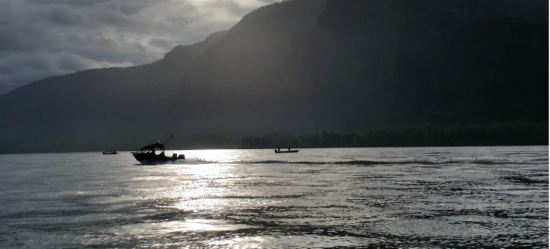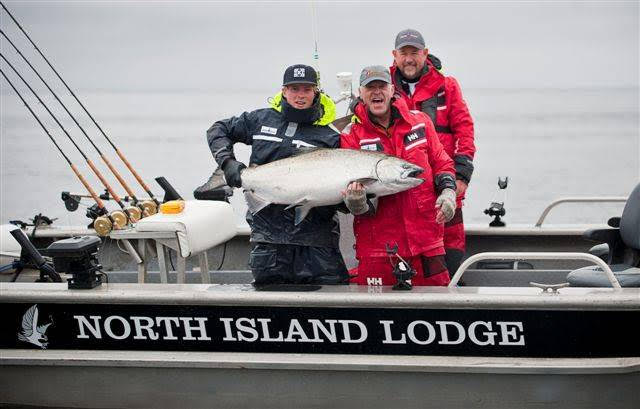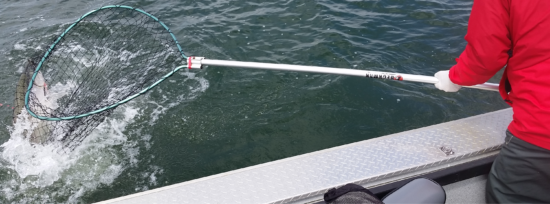
Columbia Salmon Reforms Subpanel Recommends 2016 Allocations To OR, WA Fish Commissions
Supporters of Columbia River salmon reforms are urging anglers to get in touch with fishery overseers and one state’s lawmakers after a subpanel of the Oregon and Washington Fish and Wildlife Commissions this week voted to revert to 2016 benchmarks.

“.. Stop bowing to small special interest groups and start leading in managing our fisheries for abundance,” reads a Coastal Conservation Association of Oregon letter posted on Facebook after Tuesday’s recommendation on an amended “Option 1.”
That came out of a six-hour meeting of three members from both states and now goes to the full commissions for consideration and final approval, with Washington possibly deciding as early as tomorrow whether to go along with the pause or not.
Essentially, sport and commercial allocations for spring and summer Chinook would fall back from 2018’s 80-20 to 70-30, the level that fall kings are being fished at, and the transition from gillnet to alternative gear only in the mainstem would be postponed, with both allowable.
Thrown into the bargain is a relaxing of the mandatory barbless hook requirement for anglers “effective as soon as practical but by June 1, 2019 at the latest,” according to a WDFW staff summary.

Concerned about closures in your area? Book the world’s best salmon and halibut fishing in Haida Gwaii (Queen Charlotte Islands), Canada. Click HERE to learn more.
Members voting against the proposal were Washington’s Dave Graybill of Leavenworth and Oregon’s Bob Webber of Port Orford.
Voting to recommend it were Bob Kehoe of Seattle, Bruce Buckmaster of Astoria and Holly Akenson of Enterprise.
Hockinson, Washington’s Don McIsaac, who chaired the subpanel, “announced the motion would pass without the Chair voting and did not vote,” according to WDFW documents.
Option 2 would have stuck to Washington’s 2018 policy — 80-20, 80-20, ~75-~25 for spring, summer and fall Chinook with no mainstem gillnets — while Option 3, the “no loss of economic benefit alternative,” had two choices with ~65-~35 splits on fall Chinook with one banning gillnets and the other allowing it.
Under Option 1, 2019 spring Chinook shares would remain at 80-20 unless an inseason update suggests we’ll see more than 128,000 upriver-bound kings, and then 70-30 would come into play.
THE COLUMBIA REFORMS WERE AGREED TO BY Washington and Oregon back in 2012 and began to be implemented in 2013.
They prioritized developing new alternative nontribal commercial gear in the mainstem, moving netting to off-channel areas near the mouth, and increasing allocation for sportfishers.
Allocations are essentially allowable catch impacts on Endangered Species Act-listed salmon.
In part, the move also aimed to help more wild salmon and steelhead get through to upstream spawning grounds.
But certain aspects have proved difficult to achieve, including the search for alternative gear and finding bays on the Washington side for the net fleet, leading to discontent from commercial interests.
That first led to a pause in the transition for fall Chinook and then a large review of how the whole program has worked and review by the subpanel, which brings us to today.

A WDFW STAFF SUMMARY OF THE SUBPANEL’S “RATIONALE” for recommending Option 1 states:
* Comprehensive Evaluation of Washington Policy showed Policy did not work as expected.
* Goal to have concurrent policies for 2019 (and beyond).
* Current WA Policy includes an adaptive management provision –make changes when the assumptions are not met.
* There is no substantial difference between the options regarding conservation benefits.
* No significant change in angler trips between options, and remains above pre-policy baseline.
* Option 1 goes the furthest towards increasing commercial ex-vessel values.
* Original policy goals were good but did not sufficiently employ the adaptive management provisions that were included in the policies.
Subpanel members who opposed it believed it:
* Should not increase allocation for commercial fishery in 2019 due to forecasts.
* Maintain escapement to upriver areas by not increasing commercial allocation
This year’s Columbia Chinook expectations are on the low side, with 99,300 upriver springers and 157,500 overall, 35,900 summer kings and 340,400 fall brights and tules.
EVEN AS ODFW AND WDFW’S FULL COMMISSIONS PONDER this week’s recommendation, a bill active in Washington’s legislature seeks to remove nontribal gillnets from that state’s side of the Columbia.
While three cosponsors — Sens. Mona Das, Joe Nguyen and Emily Randall, all Democrats — appear to have since abandoned it, SB 5617 cleared one committee ahead of last week’s initial bill deadline and has been referred to Senate Ways and Means.
That committee is chaired by Sen. Christine Rolfes (D), who earlier this session spoke in favor of the bill as codifying WDFW policy.
And CCA Oregon has drummed up a letter for fishermen to send to both states’ managers and overseers.
“Over a hundred thousand sport fishers in each state are funding both DFWs while a few dozen are driving reversals to allow antiquated, non selective commercial fishing gear, that was outdated and outlawed in the rest of the state (of Oregon) since the last century,” the letter reads in part.
“I respectfully ask you to please not endorse the proposed changes to allow more commercial gillnet seasons on the river. I also urge you to stop bowing to small special interest groups and start leading in managing our fisheries for abundance.”
And they’ve also come up with information to send to Oregon lawmakers.
AS FOR NEXT STEPS, ON SATURDAY MORNING IN SPOKANE, Washington’s full Fish and Wildlife Commission will take up the subject — here are links to documents WDFW staff has prepared — with Oregon’s expected to on March 15.
The overarching goal is to set concurrent seasons ahead of the bulk of 2019’s fisheries, which are being discussed and set this month and next through the annual North of Falcon salmon-season-setting process.
How it all shakes out will be very interesting. Hold on to your hats, kids.
